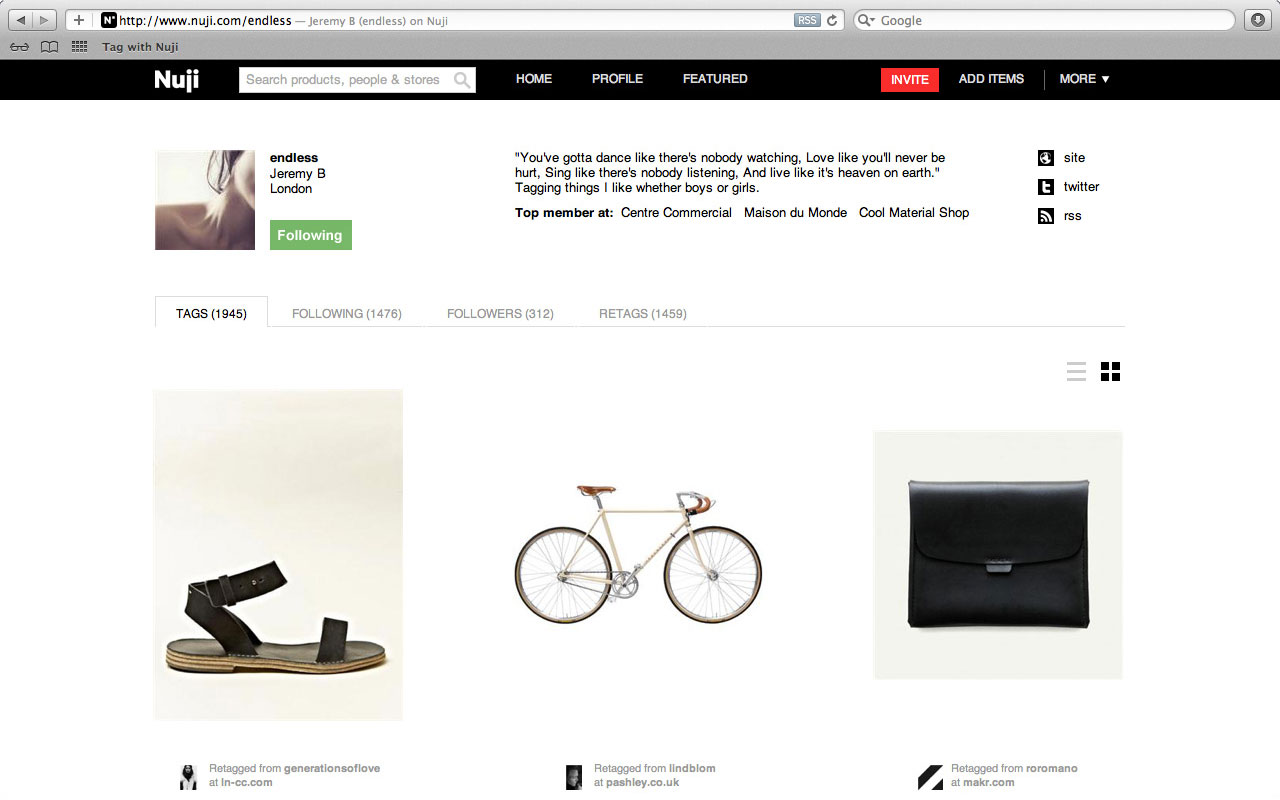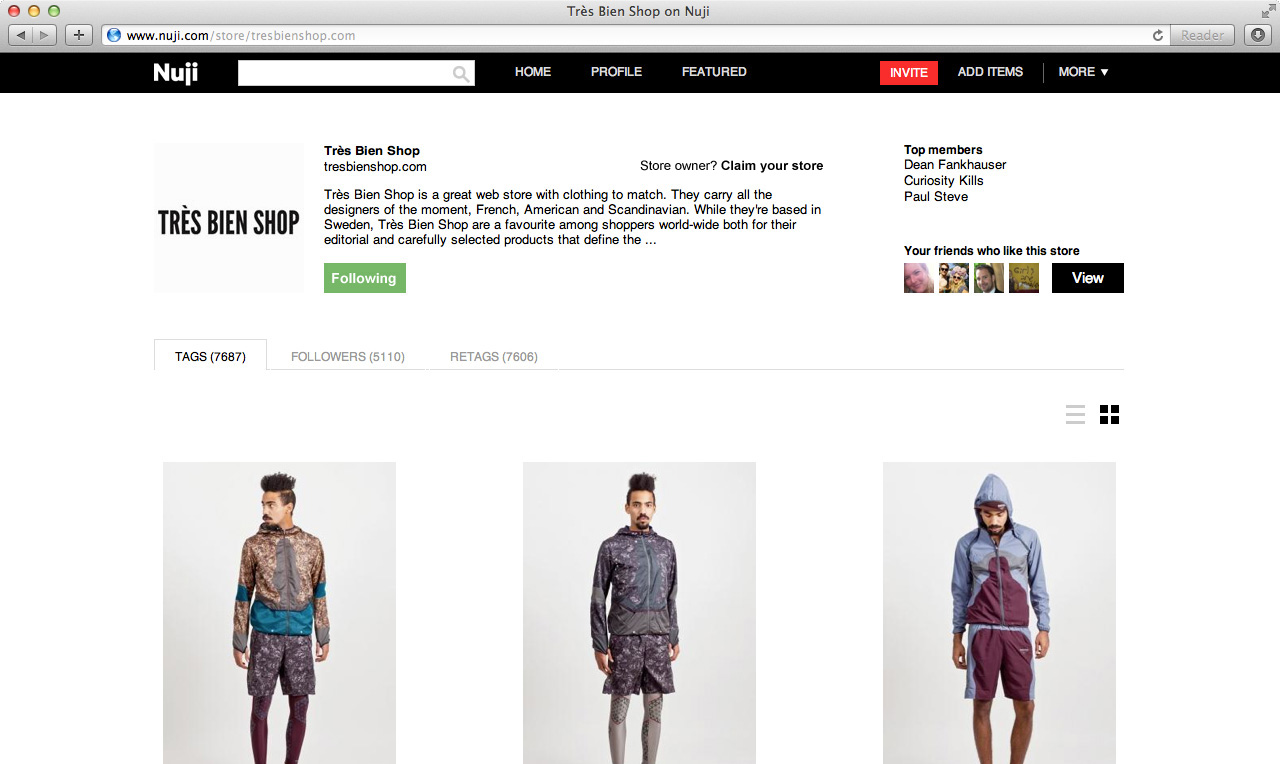Dean Fankhauser
Nuji's co-founder on the future of retail, both online and on the high street.

"There are big changes coming. And change is positive.” Something is afoot in the world of retail. High Street stores are struggling to match the choice, convenience and price that their online adversaries are able to offer. How can a physical space ever match the ease or direct-to-your-door delivery service that a website can? Perhaps the one thing stores can offer that most of their digital counterparts can’t is the human interaction aspect of shopping. Being surrounded by likeminded people who share similar tastes and interests is something that has yet to be replicated online. Or at least that was the case until Nuji launched last year. Now CEO Dean Fankhauser and his crack team of dedicated online retail curators look set to drive the final nail into the coffin of the traditional high street store.
<p>Nuji acts as a one-stop online location for 30,000 premium fashion, lifestyle and furniture stores, and offers users the ability to ‘tag’ items that catch their eye. Thereby, over time, each user creates a personalised collection of products that are unique to their tastes. By compiling data from the profiles of other similar users, Nuji is able to accurately recommend new products based on a system far more reliable than the usual suggestion-engines that are based on other people’s purchases. In fact, it was this very idea that sowed the seed in a young Dean Fankhauser’s mind over a decade ago. “I’d scroll down the page on a retail site and they’d have that section for ‘people who bought this, also bought this’. And, for me, that was the first inception of ‘social shopping’.” </p>
<p>With a background in online strategy at various digital agencies including Yahoo, Dean was well equipped to set up on his own in 2010. He’d worked with his team previously, but why set their sights on retail? “We knew that there were some very, very interesting things happening in this space.” And not just online. Retail in general was, and still is in a state of transformation. “There was a lot of disruption happening throughout the industry ... It began with a couple of verticals – books, music, that sort of thing – but has grown since then.”</p>
<p>Taking Netscape creator Marc Andreessen’s quotation that, “software is eating the world” as their mantra, the Nuji team set about finding a way to apply it to retail. “The idea of software eating the high street” as Dean puts it. Traditional, big name, big brand shops are in trouble, it seems, and partly because sites like Nuji are able to offer something that they can’t. “If you look at any social shopping site,” Dean says, the really successful ones are the ones that tap into our narcissistic values.” And it’s this social aspect that gives Nuji its unique selling point. Being able to share your tastes with the wider world, to inspire and be inspired by your peers is what sets the site apart from many of its competitors. And the option to share not just what you’ve bought, but also what you’d like to buy is a hugely popular aspect of the Nuji offering. “People just eat that up. They absolutely love it.”</p>
<p>So with the future of innovative online retail looking decidedly rosy, what do these developments have in store for offline stores? Will bricks-and-mortar spaces simply serve a branding function and act as windows for a brand’s online service? “I’m not sure how that can be economically viable.” Dean says. So the need for a physical space may truly be dwindling. In the future your big name stores, your Urban Outfitters or Topshops, may have less and less need to exist on the high street. “They might have one flagship in London as a showroom, but most of the stuff will be bought online,” he says.</p>
<p>But this is not to say that it is only offline retail that is facing a period of significant upheaval. Online is in need of a dramatic overhaul as well. According to Dean the big names in online retail – Amazon and Ebay and so on – are also set for a wake up call. “All these new technologies, these platforms, they haven’t been embraced properly. It’s not really built into their product.” The next generation of e-commerce will be led by companies that understand the implications and opportunities that new technology will bring.</p>
<p>With this idea of convenience trumping store identity, where does that leave services like Nuji? What does the future hold for them? Dean is as optimistic as he is realistic, “Ideally it would be a one-stop destination where you have all your stores.” One that is as helpful, insightful and intelligent as the most knowledgable shop assistant – and Nuji has thousands more relevant product recommendations than any offline store ever could. “You come into Nuji and you say you want a pair of black jeans that are £100-£150 from this store, this store or this store, that this person, this person and this person like. And in one universal search you’ve got all that.”<p/>
<p>Adapting to, and predicting the direction of the rapidly changing landscape of e-commerce is vital to Nuji’s success, but Dean feels confident that his team know what they’re doing. Looking to the future he recognises this, “there’s going to be some pretty scary things happening. But exciting at the same time. There are big changes coming. And change is positive.”</p>http://www.nuji.com/







Discussion